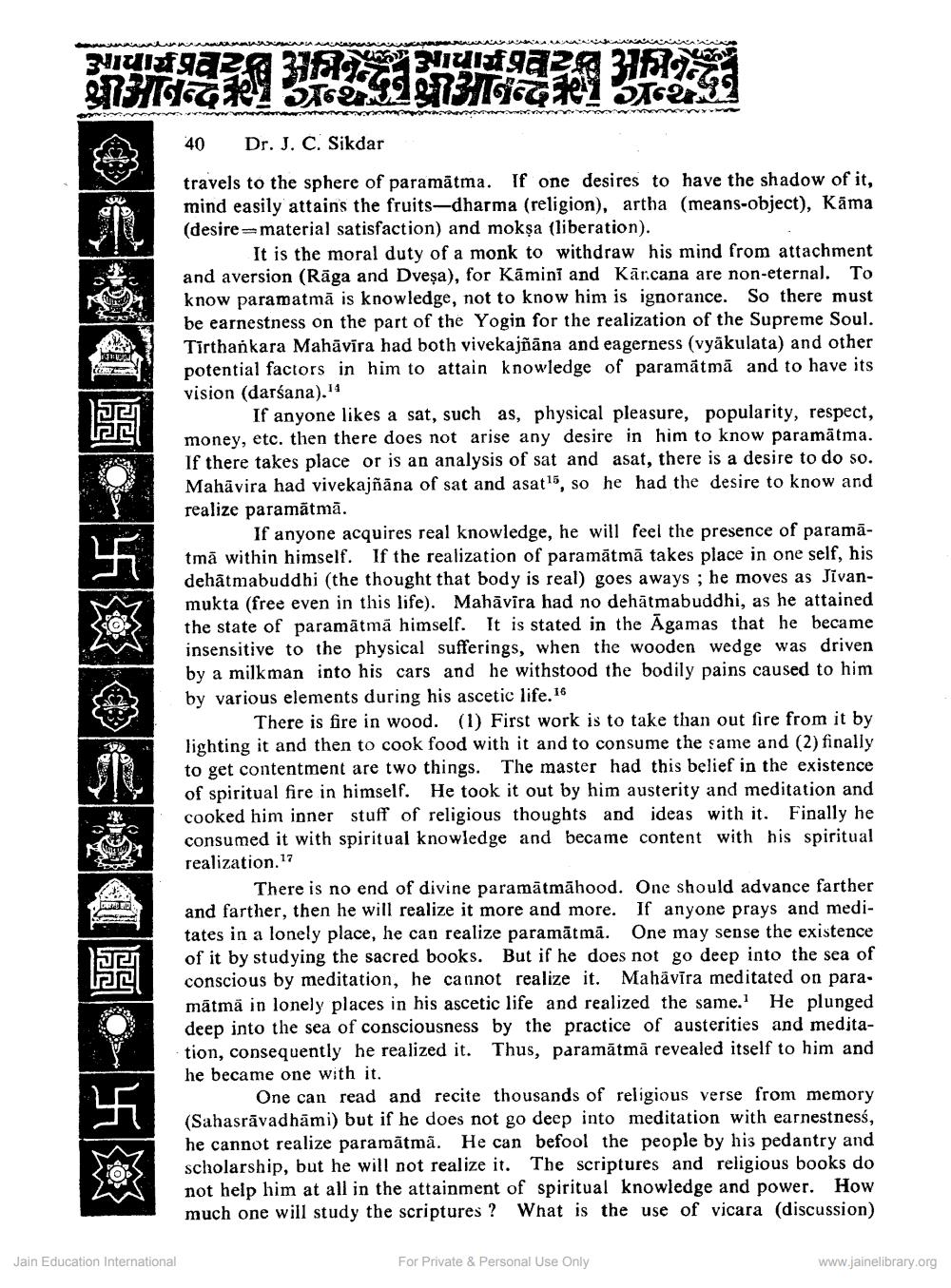Book Title: Reflection on the Life of Mahavira Author(s): J C Sikdar Publisher: Z_Anandrushi_Abhinandan_Granth_012013.pdf View full book textPage 4
________________ MAAR LAAAAAAAIA SANAAALAAALAAAAAAAAAAAAAAAAAAAAAAA Zuigizada 31 Bulgaz 33€ 15 T RY STAR410731776GFRI STA92 40 Dr. J. C. Sikdar travels to the sphere of paramātma. If one desires to have the shadow of it, mind easily attains the fruits-dharma (religion), artha (means-object), Kāma (desire-material satisfaction) and moksa (liberation). It is the moral duty of a monk to withdraw his mind from attachment and aversion (Räga and Dveşa), for Kāmini and Kär.cana are non-eternal. To know paramatmā is knowledge, not to know him is ignorance. So there must be earnestness on the part of the Yogin for the realization of the Supreme Soul. Tirthankara Mahāvīra had both vivekajñāna and eagerness (vyākulata) and other potential factors in him to attain knowledge of paramātmā and to have its vision (darśana).14 If anyone likes a sat, such as, physical pleasure, popularity, respect, money, etc. then there does not arise any desire in him to know paramātma. If there takes place or is an analysis of sat and asat, there is a desire to do so. Mahāvira had vivekajñāna of sat and asat 15, so he had the desire to know and realize paramātmā. If anyone acquires real knowledge, he will feel the presence of paramātmā within himself. If the realization of paramātmā takes place in one self, his dehātmabuddhi (the thought that body is real) goes aways ; he moves as Jivanmukta (free even in this life). Mahāvīra had no dehātmabuddhi, as he attained the state of paramātmā himself. It is stated in the Āgamas that he became insensitive to the physical sufferings, when the wooden wedge was driven by a milkman into his cars and he withstood the bodily pains caused to him by various elements during his ascetic life.16 There is fire in wood. (1) First work is to take than out fire from it by lighting it and then to cook food with it and to consume the same and (2) finally to get contentment are two things. The master had this belief in the existence of spiritual fire in himself. He took it out by him austerity and meditation and cooked him inner stuff of religious thoughts and ideas with it. Finally he consumed it with spiritual knowledge and became content with his spiritual realization.17 There is no end of divine paramātmāhood. One should advance farther and farther, then he will realize it more and more. If anyone prays and meditates in a lonely place, he can realize paramātmā. One may sense the existence of it by studying the sacred books. But if he does not go deep into the sea of conscious by meditation, he cannot realize it. Mahāvīra meditated on para. mātmā in lonely places in his ascetic life and realized the same. He plunged deep into the sea of consciousness by the practice of austerities and meditation, consequently he realized it. Thus, paramātmā revealed itself to him and he became one with it. One can read and recite thousands of religious verse from memory (Sahasrāvadhāmi) but if he does not go deep into meditation with earnestness, he cannot realize paramātmä. He can befool the people by his pedantry and scholarship, but he will not realize it. The scriptures and religious books do not help him at all in the attainment of spiritual knowledge and power. How much one will study the scriptures? What is the use of vicara (discussion) 2C does not so be fool the peo and religiouwer. How Jain Education International For Private & Personal Use Only www.jainelibrary.orgPage Navigation
1 2 3 4 5 6 7 8 9 10 11 12 13 14 15
